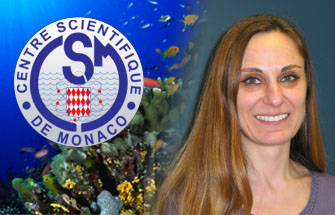The Scientific Centre of Monaco (CSM) was created in 1960 by Prince Rainier III with the aim of endowing the Principality of Monaco with the means to conduct scientific research studies and to support the work of government and international organisations responsible for protecting and conserving marine life.
Since 1989, the CSM has specialised in studying the functioning of coral reef ecosystems (tropical and Mediterranean) in relation to global climate change. Marine bio-mineralization and symbiosis, which are the key biological processes in these ecosystems, are studied from the molecular and cellular to organism scale by two research teams with complementary skills: a Physiology & Biochemistry team and an Ecophysiology team.
The link between marine, medical and polar biology, the Scientific Centre of Monaco’s research centres and economics is not an obvious one. Nevertheless, Nathalie Hilmi, a macro-economics Ph.D. student is Research Director there. The justification of her unit seems to follow naturally: it is simply to assess the damage caused by what novices would call “pollution of our planet” or specifically “climate change” and “ocean acidification.” We are talking about environmental economics, while sustainable development is built on 3 cornerstones: the economy, the environment, and social matters. “It’s a question of firstly quantifying the cost of action, and inaction, regarding damage caused to biodiversity.” Here is an example: ocean acidification leads to the extinction of certain species and so to a fishing and aquaculture deficit. This will have an impact on food security, particularly on small islands where it is very difficult to find food. “The impact of the damage can be very strong on the economy and society, greatly affecting tourism, for example. The places will become deserted, their populations will migrate or even disappear. Not to mention the cultural aspect: certain communities believe that their ancestors’ souls are reincarnated in some species, such as coral reefs, so their extinction is seen as a real tragedy.”
So, economics is at the service of great causes linked to sustainable development, with some very practical applications: a workshop is organised every 2 years and leaflets are extensively distributed to explain the financial and economic impact of the degradation of ocean waters. “Politicians understand the stakes much better when they are quantified, talks about biology are not accepted in the same way.” The research is conducted principally in a network, with contacts worldwide - the stakes are international. The presentation of the conclusions of the last workshop took place at the UN. Nathalie Hilmi confirms, “this gives a very important publicity to our work. Real resonance, brought by H.S.H. the Sovereign Prince, whose involvement in these areas helps us very much. Monaco is now cited as an example in ocean acidification economics.” The medium-term objective is the establishment of sustainable development indicators, advocated by the OECD. Close collaboration with Monaco Statistics, the Government and the Monaco financial sector should allow a rise to the challenge.






